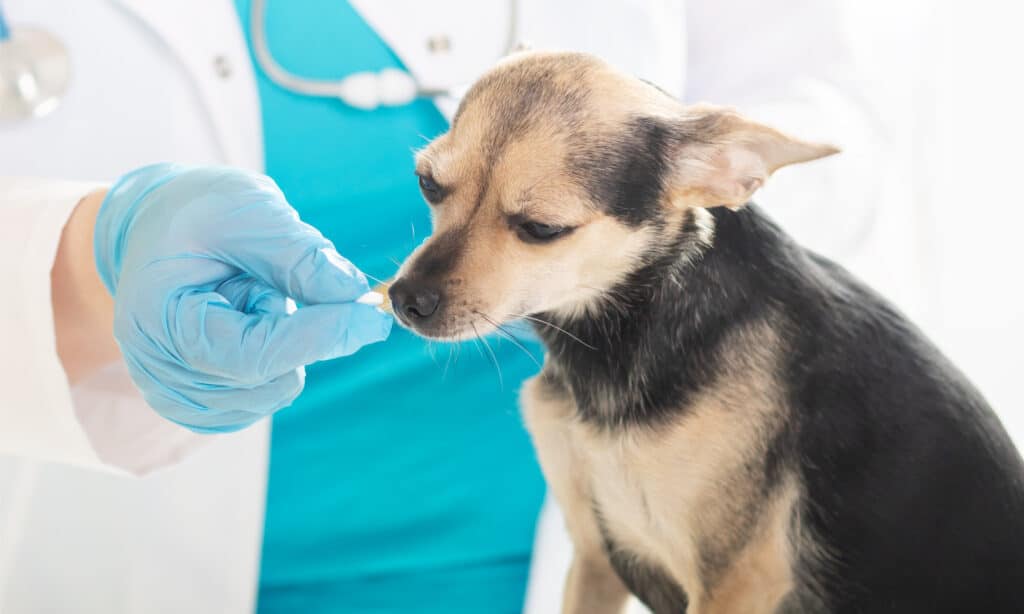Has your veterinarian prescribed ivermectin to protect your dog against heartworm disease? You likely have questions about this medication and how it works, so let’s break down everything you need to know about ivermectin use in dogs below!
What Is Ivermectin?

Ivermectin is commonly used to prevent heartworm disease in dogs and cats.
©Donna Ellen Coleman/Shutterstock.com
Ivermectin is an anti-parasitic medication used in human and veterinary medicine. It is most commonly used to prevent heartworm disease in dogs and cats, but it can be used to treat other intestinal and external parasites seen in pets as well.
Ivermectin works by targeting the parasite’s nervous system and interfering with the nerve and muscle systems. This process paralyzes the parasite and leaves it defenseless, ultimately resulting in its death. The treatment protocol will vary based on the parasite that is being treated.
Is Ivermectin Safe For Dogs?
Ivermectin is safe for use in dogs when following your veterinarian’s dosing instructions. It’s important to keep in mind that while ivermectin is generally safe when following skilled dosing guidance, ivermectin use can lead to serious health complications if your dog receives an inadequate dose for their condition.
For example, overdose of ivermectin in dogs can lead to severe neurological symptoms like muscle tremors and seizures. Ivermectin can also be dangerous to use without guidance if your dog has heartworm disease. If a large amount of microfilariae (baby heartworms) are in the dog’s bloodstream when the ivermectin is given, the ivermectin may cause the microfilariae to die suddenly, triggering a shock-like reaction that can be fatal.
Ultimately, ivermectin is only safe when following veterinary guidance. This is important to be aware of due to how many feed stores and pet stores sell ivermectin over the counter. If you do choose to purchase an ivermectin product over the counter, just be sure to reach out to your vet for administration guidance before offering it to your dog.
Why Do Dogs Take Ivermectin?
Dogs take ivermectin to treat and manage a variety of parasitic infections. Some of the most common parasites that ivermectin can treat include:
- Heartworm prevention
- Hookworms
- Roundworms
- Ear mites
- Mange
- Scabies
- Lungworms
Ivermectin can technically treat the parasites listed above, but your vet will often use other deworming agents like pyrantel and fenbendazole to treat intestinal parasites. Veterinarians occasionally use ivermectin off-label, so it is possible that your veterinary team may suggest the use of ivermectin for conditions that are not listed above.
How Do I Give My Dog Ivermectin?

Ivermectin is often combined with other deworming agents to fight off intestinal parasites while preventing heartworm disease.
©Alexsander Ovsyannikov/Shutterstock.com
Ivermectin can be found in pill, chewable, topical, paste, powder, and injectable form. It can be given with or without food, but some dogs may struggle with nausea or vomiting soon after administration when it is given on an empty stomach. We suggest giving it with a small meal if this is the case for your little one.
Ivermectin may also be combined with other deworming medications. This helps to ensure that not only is your dog being protected against heartworm disease, but they are being treated for intestinal parasites as well. Combining ivermectin with other deworming agents is most effective when treating parasites like hookworms, roundworms, and whipworms.
What Is The Dose Of Ivermectin In Dogs?
Before we offer the standard dose for ivermectin use in dogs, we should say again that you should never give your dog ivermectin without veterinary approval. With that in mind, there is a standard ivermectin dose range that most veterinarians follow!
The standard dosing range for monthly ivermectin for heartworm prevention is 0.0015 to 0.003 mg per pound of body weight. The ivermectin dose for skin mite treatment is typically 0.15 mg per pound of body weight for 10 to 14 days. And last, the standard dose for intestinal parasites is 0.1mg per pound of body weight one time.
Are There Any Side Effects With Ivermectin Use In Dogs?
Ivermectin is generally well-tolerated when it is given under veterinary guidance. The most common adverse effects with ivermectin use occur when their is an accidental overdose. This is most common when ivermectin is given for long periods for skin mites, or if the dog accidently consumes a large amount of the medication.
Some of the most common signs of an ivermectin toxicity in dogs include:
- Vomiting
- Diarrhea
- Disorientation
- Wobbly gait
- Increased salivation
- Dilated pupils
- Body tremors
- Seizures
- Collapse
It’s important to have your dog assessed by a vet immediately if they are experiencing any of the above symptoms after ingesting ivermectin. Ivermectin overdose can be life-threatening if it is left untreated.
Risks Associated With Ivermectin Use In Dogs

Ivermectin can be found in pill, chewable, topical, paste, powder, and injectable form.
©iStock.com/Yana Tikhonova
It’s important to keep in mind that some canine friends can be more sensitive to ivermectin than others. Some breeds of dog have a specific genetic mutation (MDR1) that makes it harder for their body to tolerate high doses of ivermectin, often increasing their risk of life-threatening toxicity. Vets are either incredibly careful when prescribing ivermectin to sensitive dog breeds, or they simply use another form of heartworm prevention altogether.
Dr. Amy Nicole Lewis, a veterinarian with Worlwide Veterinary Services told A-Z Animals that Collies, Shepherds, Whippets, Sheepdogs, Skye Terriers, McNabs, and Windhounds can be sensitive to ivermectin. Heartworm prevention often contains such a low dose of ivermectin that these dogs show no issue, but if a pet parent is worried, we will prescribe other preventative options.
How Can I Get Ivermectin For My Dog?
Ivermectin should only be purchased at your vet’s office and it should only be given under veterinary guidance. If you do choose to purchase it over the counter, we always suggest reaching out to your veterinary team for dosing instructions. Involving your vet team can significantly decrease any ivermectin toxicity risks.
Be sure to review the information above to better understand how ivermectin can help your canine friend!
The photo featured at the top of this post is © New Africa/Shutterstock.com
Ready to discover the top 10 cutest dog breeds in the entire world?
How about the fastest dogs, the largest dogs and those that are -- quite frankly -- just the kindest dogs on the planet? Each day, AZ Animals sends out lists just like this to our thousands of email subscribers. And the best part? It's FREE. Join today by entering your email below.
Thank you for reading! Have some feedback for us? Contact the AZ Animals editorial team.






